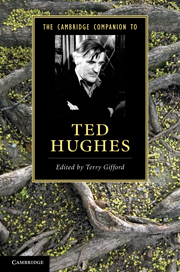Book contents
- Frontmatter
- Contents
- Acknowledgements
- Contributors
- Note on Referencing and Abbreviations
- Chronology
- Introduction
- 1 The problem of biography
- 2 The debates about Hughes
- 3 Hughes and animals
- 4 Ted Hughes and Sylvia Plath
- 5 The anthropologist’s uses of myth
- 6 Hughes’s social ecology
- 7 Hughes and feminism
- 8 Hughes and the classics
- 9 Hughes as prose writer
- 10 Hughes on Shakespeare
- 11 Class, war and the Laureateship
- 12 Hughes and his critics
- Guide to further reading
- Index
8 - Hughes and the classics
Published online by Cambridge University Press: 28 July 2011
- Frontmatter
- Contents
- Acknowledgements
- Contributors
- Note on Referencing and Abbreviations
- Chronology
- Introduction
- 1 The problem of biography
- 2 The debates about Hughes
- 3 Hughes and animals
- 4 Ted Hughes and Sylvia Plath
- 5 The anthropologist’s uses of myth
- 6 Hughes’s social ecology
- 7 Hughes and feminism
- 8 Hughes and the classics
- 9 Hughes as prose writer
- 10 Hughes on Shakespeare
- 11 Class, war and the Laureateship
- 12 Hughes and his critics
- Guide to further reading
- Index
Summary
Hughes’s engagement with classical texts was not that of the ‘lapsed classicist’ whose formal acquaintance with Greek and Latin literature provided a privileged frame of reference throughout his life, nor was he a self-declared ‘outsider’ for whom the appropriation of the classical constituted a defiant political gesture. Hughes’s interest in ancient literature was distinctive precisely because it formed part of a much wider interest in the narrative repositories of the past and did not treat material from Greece and Rome with particular reverence. His preoccupation with what he described as the ‘mythic’ quality of writers led him to construct a poetic genealogy within which Aeschylus and Euripides took their place alongside Milton, Coleridge, Keats and Yeats, and to value the work of both ancient and modern poets as much for what eluded expression as for their words. On Hughes’s reading, classical authors were oriented away from their place in the literary canon and re-evaluated for the part they play in rendering visible archaic matter, the productions of the collective mythic imagination, now dimly remembered by an aggressively modern world as dream.
- Type
- Chapter
- Information
- The Cambridge Companion to Ted Hughes , pp. 107 - 120Publisher: Cambridge University PressPrint publication year: 2011
- 1
- Cited by



